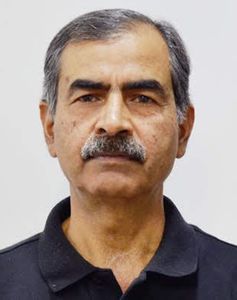Petitioners who approached the SC against the Electoral Bonds Scheme, disagree
In 2017, shortly after the budget speech in Parliament, in which then finance minister Arun Jaitley spelt out the government’s intent to introduce the Electoral Bonds Scheme, the Association for Democratic Reforms (ADR) and Common Cause, two civil society organisations, mounted a joint legal fight against the scheme. Around the same time, Commodore Lokesh Batra (retd), a Navy veteran who now describes himself as a transparency campaigner, began his dogged pursuit against the scheme through the Right to Information Act.
It took seven years for these activists to find success, with the Supreme Court, on February 15, declaring the scheme unconstitutional and invalid. “The court has upheld the right to information of the common man about funding of political parties,” said ADR head Maj Gen Anil Verma (retd). “The scheme had grave anomalies which the Election Commission, the Reserve Bank of India, government departments and civil society organisations had pointed out, but the government had rammed it through Parliament in the form of a Money Bill to escape scrutiny by the Rajya Sabha.”
The petitioners had argued that wide-ranging amendments in the Finance Act, 2017; Finance Act, 2016; the Representation of the People Act, 1951; the Reserve Bank of India Act, 1934; the Income Tax Act, 1961; and the Companies Act, 2013, were brought in as part of a Money Bill. The apex court has not yet resolved the matter about the government’s money bill route.
Vipul Mudgal, who heads Common Cause, said Jaitley’s speech had the initial effect of making people believe that political funding would actually be made transparent and the system would be made free of black money. “However, it was clear immediately afterwards, especially after the many laws that were amended, and the changes that were brought in illegally as part of a Money Bill, that the purpose of the scheme was something totally different,” he said.
ADR and Common Cause had filed a petition in the Supreme Court on September 4, 2017, challenging the Finance Act, 2017, which they said was illegally enacted as a Money Bill. It was through the amendment in the Finance Act in 2017 that the Electoral Bonds Scheme was introduced in 2018. The petition also challenged the act removing the earlier cap of 7.5 per cent of the donor company’s average three-year net profit for political donations. Other petitioners like the CPI(M) and the Congress’s Jaya Thakur joined in much later.
On March 5, 2019, ADR and Common Cause filed the first application for stay against the sale or purchase of electoral bonds for the Lok Sabha elections that year. It was argued that political parties would receive huge corporate funding during the elections and this would play a critical role in the polls. The court, in its interim order dated April 12, 2019, directed all political parties to submit details of donations received via electoral bonds to the Election Commission in a sealed cover on or before May 30, 2019. It had refused to put the scheme on hold though.
Verma recalled that the matter was listed on the court’s website on several occasions since the 2019 interim order, but no date of hearing was provided. Finally, the hearing was scheduled for March 2023, when the initial arguments took place. On October 16, 2023, a bench of the Supreme Court, headed by Chief Justice of India D.Y. Chandrachud, referred the petitions against the scheme to a five-judge Constitution bench. The hearing by the bench began on October 31. It was reserved for judgment on November 2.
The main issues raised by the petitioners included the anonymity of electoral funding and what they argued as the legitimisation of high-level corruption by removing funding limits by corporate donors and by making it possible for funding by foreign interests and lobbyists.
Batra, meanwhile, gathered significant information through RTI about the discussions within the establishment with regard to the bonds, the reservations expressed by the Election Commission, the RBI, State Bank of India and other departments, and crucial statistics with regard to the bonds sold and purchased, the amounts involved and the patterns therein. These documents and statistics enabled petitioners to strengthen their arguments before the court.
Delhi-based Batra, too, was taken in by Jaitley’s speech, but he soon realised that the “measure would not bring transparency in political funding,” he said. “The identity of the donors was to be kept anonymous. How can transparency and opacity go together?” So, he took the RTI route. “It was clear from all these letters that the EC and the RBI and even government departments themselves had raised many red flags regarding the scheme,” said Batra. “But the government appeared to have already made up its mind. For example, there are documents that show that the RBI was approached for its views on the eve of the budget speech, more like an afterthought.”
The documents from SBI showed that bonds worth Rs16,518 crore were sold from March 2018 to January 2024 in 30 phases, and 94.64 per cent of these were of the highest Rs1 crore denomination.
Verma, however, does not expect anything spectacular to come out from the disclosures that the court has asked the EC to make about donors and the amounts involved. “The expectation of the common man is that big names would figure in the list. That would be unlikely,” he said. “I don’t think the big corporates would have bought the bonds directly.”
It is also felt that the verdict will not really impact the parties in the coming Lok Sabha polls since the money donated so far through the bonds has already been invested or spent by them. However, Batra said that the government could have opened a window of 30 days for sale of electoral bonds starting from February-end. “At least that will not happen now,” he said. “Also, the court wants the bonds that have not been encashed to be refunded. But as per the rules, the bonds have a shelf life of 15 days, and the last phase of sale of bonds was in January, so that time limit is already over.”
Verma said that old methods of electoral funding still exist, and donations by undeclared donors far outweigh that by declared donors. “Cash seizures during elections have gone up many times, which shows that the use of black money in elections is far from over,” he said. “Also, what is declared by the parties as their expenditure on elections is just a fraction of what is actually spent in our elections.”
Electoral bonds are history. But much more needs to be done to make political funding transparent.




